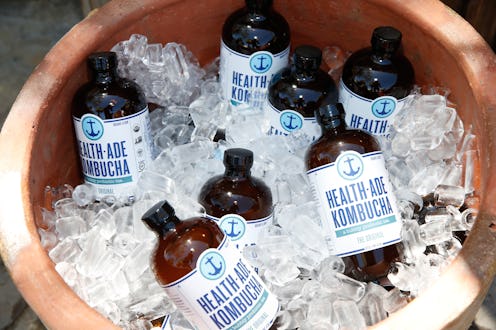Life
9 Myths About Probiotics That Aren’t True

You've likely heard of probiotics, the magical supplements that can improve digestion and clear your skin. Of course, there are several benefits to taking probiotics, but it's a good idea to forgo the myths about probiotics that can actually mess with your gut or make your efforts less effective. So, before choosing your probiotic brand of choice, look to these tips on making the right decision and finding the best type for your specific health needs.
As a certified health coach, I work with clients on improving their digestive health and as well as keeping bowel movements regular and preventing stomach pains. And, turns out, probiotics can actually help with that, because they restore potent, beneficial gut bacteria and flora which can boost your immunity, lower inflammation, and keep things moving throughout the digestive system, consistently. You can take probiotics in capsule form, as a powder to dissolve in beverages, or even through food, such as in Greek yogurt, fermented veggies and drinks (like kombucha), or sauerkraut. Yet, be warned: there are a few misconceptions that exist surrounding probiotics that aren't true. By taking the right type of probiotic, with proper direction and guidance, you'll reap all the health benefits. Here are nine common myths about probiotics that aren't true.
1Probiotics Only Come From Yogurt
You don't need to eat dairy to get probiotics through food, and it's pretty common for people to assume Greek yogurt is the magic formula for probiotic strains. "[Y]ou can also eat anything that's pickled for benefits," Andrea Fornarola of Elements Fitness tells Bustle. "Back in the day, we would pickle food for a preservation. Now, with refrigeration we pickle less food, but those fermented foods still offer benefits."
2Probiotics Can Only Be Eaten Room Temperature
"This is a myth, as probiotics are often refrigerated (unless pickled)," says Fornarola. And, Fornarola says you may not be getting the full health benefits of probiotics if you consume them at room temperature when they should be refrigerated. "[Half] of the probiotic dies, if not refrigerated properly," Fornarola says. But keep in mind, this is only when refrigeration is a necessity based on the strains and brand instructions.
3Getting Probiotics Through Food Is Enough
While you can get probiotic benefits from foods, it's not enough to make a huge difference to your gut health. Here enters the supplement, Sherry Torkos, BSc, Phm, RPh, tells Bustle. "It’s hard to quantify how many probiotics you’re consuming," Torkos says. "A lot of yogurts, for example, don’t state the amount of live cultures on their labels because probiotics are highly unstable. Also, stay away from yogurts made with added sugar, because sugar destroys the beneficial bacteria."
4You Don't Need To Feed The Probiotics
It's not just probiotics that matter, but also prebiotics, forms of carbohydrates that feed probiotics. "If your intention is to boost your probiotics intake through your diet, you also need to feed the beneficial bacteria with soluble prebiotic fiber," says Torkos. "Good sources are beans, bananas and artichokes."
5The More Probiotics On The Label, The Better
A lot of people believe that if it’s extra strength, it must be better. That’s rarely the case with probiotics, because so many factors affect their quality, from the type of strain used and manufacturing process to packaging and shelf stability. "You can’t always rely on what’s on the label," says Torkos. "Manufacturers will often overload their products with probiotics because the strains they use may not survive shelf storage until the expiration date, and they can also get destroyed in the gut after consumption. So even if they are 'supersized' there may be no benefit."
6Storage Doesn't Matter
Don't be so quick to leave your probiotics near sunlight, as you might damage the potency. "Choose a brand that is independently verified to meet its label claims," says Torkos. "Then follow the storage instructions on the label because probiotics are affected by light, moisture and temperature. And, don’t store them in your bathroom or on your windowsill."
7All Probiotic Strains Are The Same
You need to evaluate what each strain does compared with your health goals, because each probiotic strain has different benefits. "My advice is to keep it simple," says Torkos. "Look for a variety of strains, as opposed to single strain products, that are targeted to your specific needs."
8Probiotics Have To Be Expensive & Refrigerated
Of course, while some will be based on preservation needs, many types can be at room temperature and can be cheaper in price. "There are probiotic supplements out there using new patented time-release technology making the formulas shelf-stable and protected as they pass through your stomach into the gut, so more of them survive," says Torkos.
9Probiotics & Antibiotics Don't Mix
When you're taking antibiotics, you should also be taking probiotics. "Antibiotics indiscriminately wipe out all the bacteria in your microbiome, both the bad guys they are targeting and the probiotics that are working so hard to keep you healthy," says Torkos. "And when the good guys can no longer stand guard to crowd out the bad guys, and perform all of their crucial life-supporting functions, the unwanted bacteria can take over, leading to temporary diarrhea and other digestive complaints." Try probiotic supplements, or introducing fermented vegetables or drinks into your system at this time to help bring some of that healthy gut bacteria back.
If you are taking probiotics, do your research to make sure you're getting the full health benefits. Choose your brand wisely and follow the instructions to maximize absorption and keep your gut healthy.